This fall has been crazy with algorithm updates. In this article I’m going to share my thoughts on what Google is doing with the updates that have happened between September 27 and mid-October. I normally don’t like to write a post about an algorithm update until I have a really good handle on what is going on. In this case, I have some interesting ideas, but I have to tell you that really no one outside of Google knows what is happening.
Danny Sullivan from Google did confirm this week that Google has made some significant updates. He also mentioned that we should be reading the Quality Raters’ Guidelines. He shared that this update started September 24. (Most of the changes we saw started September 27). He also said that it will take a week or more to fully roll out.
This year, we shared about two broad core algorithm updates we had: in April and August. We also had a further update we can confirm, one that began the week of Sept. 24. With any broad core update, the full rollout time might be over the course of a week or longer….
— Google SearchLiaison (@searchliaison) October 11, 2018
Fall 2018 update dates
If you have been following my Google algorithm update list, you will see a lot of dates listed as significant updates.
September 27, 2018 marked what I would call a very large update. It wasn’t as big as the August 1 (Medic) Update, but it still affected a lot of sites in a very significant way. After this, we had what seemed to be tremors or smaller updates on many dates in October. October 1 seems to be a date on which a lot of sites saw changes. October 4, 6 and 8 were all dates on which sites saw traffic losses or gains as well.
I know what some of you are thinking...doesn’t Google update their algorithms every day? Back in March, Danny Sullivan from Google told us that Google releases updates every day, but every now and then they release a more broad core update:
Each day, Google usually releases one or more changes designed to improve our results. Some are focused around specific improvements. Some are broad changes. Last week, we released a broad core algorithm update. We do these routinely several times per year....
— Google SearchLiaison (@searchliaison) March 12, 2018
He also just recently told us that while the Quality Raters don’t specifically impact rankings, if we can understand how to look at sites like they do, we can potentially be seen as higher quality by Google’s algorithms.
If you understand how raters learn to assess good content, that might help you improve your own content -- and, in turn, perhaps do better in search. You can find the raters guidelines here:https://t.co/MDdKOyEjrv
— Google SearchLiaison (@searchliaison) October 11, 2018
I believe that what we are seeing now, is Google releasing a very broad change to their core quality algorithm. I also believe that these updates are all connected to one thing… Trust.
A refresher on E-A-T
When the August 1 update happened, I was quite certain that this update was connected to E-A-T. E-A-T is a bit of a buzz-word in SEO for 2018. In my opinion it is a bigger ranking factor than links. I hope to have an article out soon that fully describes E-A-T, but for now, here is what you need to know.
E-A-T is covered extensively in Google’s Quality Raters’ Guidelines. You can read the guidelines here, or if you are a paid subscriber of my newsletter, you can get a copy of my Quality Raters’ Guidelines checklist and summary. These guidelines are used to train Google’s Quality Raters. The Quality Raters are people who Google uses to do manual checks on the quality of the SERPS. While they don’t have a direct impact on what happens to your site, if a bunch of Quality Raters are noticing sites ranking that have quality issues, then this info feeds back to the Google engineers and they make tweaks to the algorithm so that those lower quality sites or pages don’t rank as well.
If you CTRL-F for E-A-T in the guidelines, it is mentioned a whopping 186 times! It is listed as the very first characteristic of a high quality page:
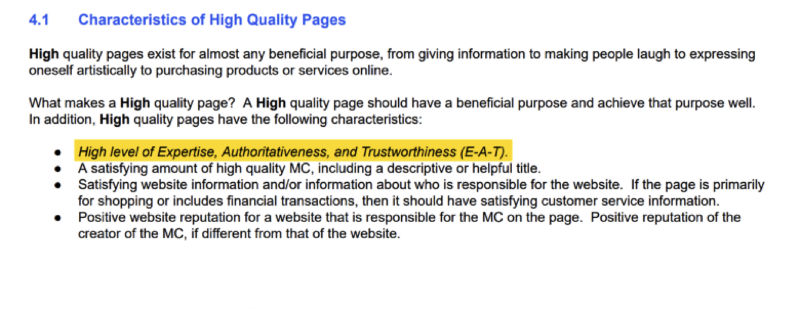
A lack of E-A-T is listed as the first characteristic of a low quality page:
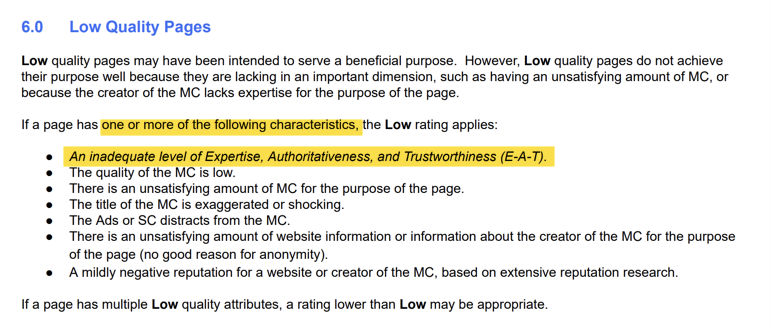
Trust me… this E-A-T thing is important.
The August 1 (Medic) Update had a lot to do with E-A-T
When I wrote about this massive algorithm update on August 1, 2018, I talked a lot about how sites with E-A-T issues saw drops. I had a lot of people comment to me that this could not be right because in some cases sites that were written by a licenced medical doctor saw massive drops.
For example, take a look at the drop seen by Dr. Axe’s site (data from SEMRush):
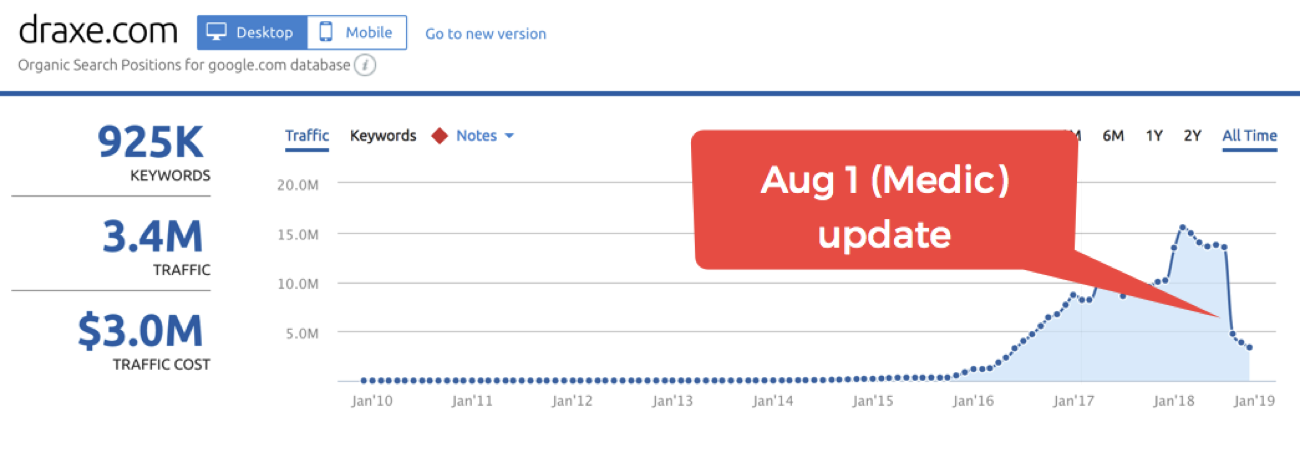
But, if you look at Dr. Axe’s bio, we can see that this guy knows his stuff! He should have good E-A-T, right?
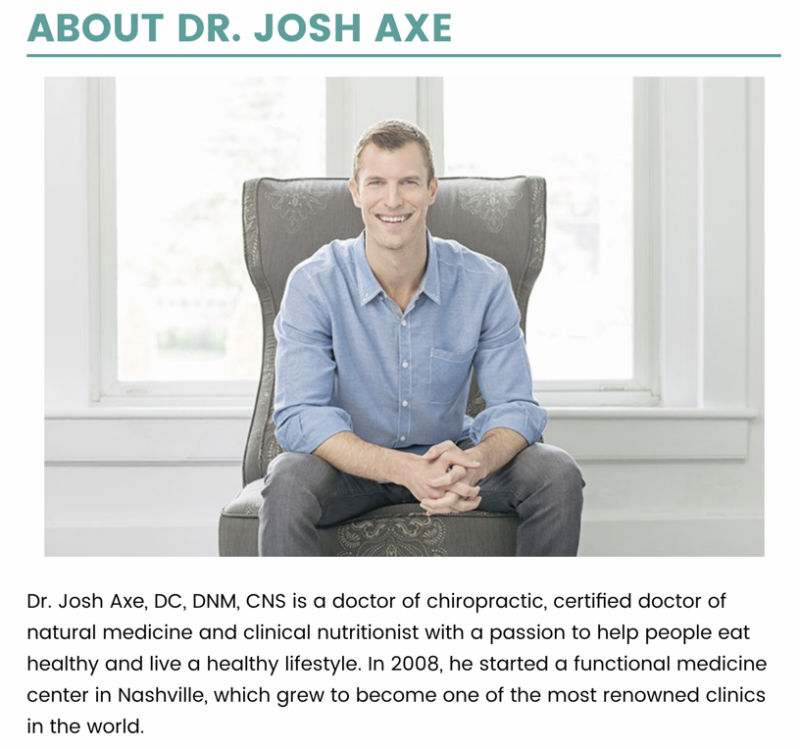
He is a doctor. He is a clinical nutritionist. He is world renowned. If he has such good E-A-T, why did his site see drops?
Initially when we looked at this we wondered if these drops had to do with the nature of his degree, as natural medicine sometimes contradicts scientific evidence, but I don’t think this is the case.
I think that what people were missing here was the “T” in E-A-T… TRUST.
Here is what the BBB profile for Dr. Axe looked like until recently:

The QRG are pretty specific about saying that a negative BBB profile is a sign of low quality.
They instruct the Raters to specifically search for a BBB listing:

They also say that a very low BBB rating is a sign of low quality.

They give examples of websites that should be considered low quality and point out their negative BBB ratings as a reason why.
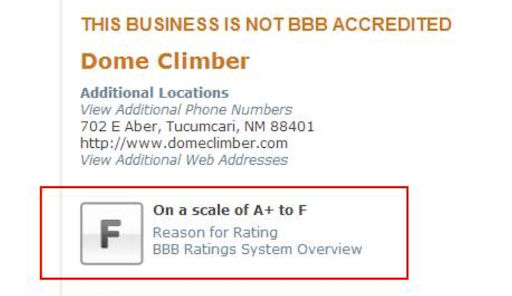

For more of my thoughts on the possible consideration of BBB ratings (as well as my thoughts on the role of the Quality Raters Guidelines as a whole) in Google's organic ranking algorithms, I took a deep dive on the subject in a separate article: "Does Google Use BBB ratings as a ranking factor?"
I do believe that Dr. Axe’s site saw drops because they were deemed as untrustworthy, mostly because people overwhelmingly had problems with refunds and returns. As such, this business is lacking in trust, the “T” in E-A-T.
Many other sites that saw big drops on August 1 had some type of issue that would cause users to possibly not trust them. Later in this article, I am going to give some examples of things that we believe can lead to a lack of E-A-T due to trust issues.
The September 27, 2018 algorithm update
From looking at client data and also winners and losers data from this great post on winners and losers of the September 27 update on Sistrix, it really does look like September 27 was a tweak of whatever changes Google implemented on August 1.
I think it’s quite possible that this is what happened:
- Google made changes in how they evaluate whether a website or page is trustworthy and they implemented those changes August 1.
- The Quality Raters now had a whole new set of sites to analyze. If they were instructed to do a search for a popular medical query, they may see new sites that are now ranking well after the algo shift.
- As the Quality Raters assessed the new SERP landscape, they were likely able to see some sites ranking well that had trust issues. It’s possible they started to look even deeper for potential trust problems.
- This information fed back to the Google engineers and they made tweaks to the algorithm again to refine how they assess trust.
- These changes went live on September 27 (or as Danny Sullivan has now told us, they started to roll out September 24, 2018).
As such, we saw several sites that saw big gains Aug 1 and then, as the algorithm reassessed trust, they saw losses:

In some cases, a site that had been seen as untrustworthy on Aug 1, saw a bit of a boost on September 27.

In my opinion, September 27 was simply a tweak to Medic.
October algorithm updates
We have seen a lot of sites that saw significant traffic changes starting in the first week of October. We saw a lot of sites that had a pattern like this where traffic plummeted on August 1 and then saw a little bit of a gain on October 1.

Other sites saw a significant jump up at another point during the first week of October.


These are not seasonal changes. I have no doubt that these sites saw improvements due to a change in Google’s algorithms.
Is this update related to links?
My team and I have spent many hours debating what these changes mean. We made some spreadsheets that look at our clients and also sites outlined as winners and losers on Sistrix to see what patterns we could see.
We noticed a very interesting thing. Every one of the sites that were our past clients, that saw significant changes in October had some type of link issue. Either we had filed a disavow, or we had recommended filing a disavow.
We don’t recommend disavowing for very many sites these days… only those with a very obvious history of manipulative link building.
]
Should we still be disavowing?
I thought I would add a paragraph here as a lot of people have been asking me lately about whether we still need to disavow in the age of Penguin 4.0 that ignores links. For over a year, I did not recommend disavowing. However, as Google has never come straight out and told us that we can ignore the disavow tool, we started to offer disavowing as a service about six months ago again. We have filed several disavows and do feel like they are making a difference. It’s often hard to measure though, as most of the sites that see improvements have also made on-site quality changes. I believe that there are algorithms outside of Penguin that look at link quality. If you have a history of building links for SEO purposes, then there is a good chance that disavowing could help.
The problem with this interesting information though, is that it didn’t all make sense. In some cases, we had filed a disavow and saw a nice increase in early October. In other cases, we had pointed out a huge link problem and recommended a disavow, and the site saw October gains even though they did not follow our advice. Some sites saw October losses despite having filed a disavow.
The point that I am trying to make is that it seems unusual to me that every one of the sites that saw changes in October had a significant number of unnatural links. Now, it is possible that this is just a coincidence as sites that saw drops with this update were generally in competitive spaces, which means that most sites will have experimented with link building. I do believe though, that part of what is happening with the algorithm right now is Google making changes in how they assess link quality.
I could be wrong on this, but I believe that link quality is now a component of trust.
I also think that it is interesting that October has historically been a big month for Penguin updates. We had Penguin updates in October of 2012, 2013 and 2014. In 2015 we had no Penguin updates and then in 2016 it updated in late September and we continued to see changes into October.
I tweeted about my theory that the October changes were related to links and I had a few people respond to say that they saw changes in sites with very few links.
Link related? I see traffic improvement on a site with low links.
— Felix (@internetfelix) October 9, 2018
If my link theory is true, then it is possible that these sites are seeing gains because competitors who were link building had some of those links devalued.
I think there is a better explanation though.
I think that all of the changes that we are seeing from September 27 and through October are related to Google’s assessment of trust. I think that links are just one of those factors. In the rest of this article, I will share some examples of things that could be causing Google to consider your site as untrustworthy. If you were negatively affected by an algorithm update on August 1, September 27, or early October of 2018, this is the part of the article to which you should be paying attention!
If you did see drops in early October, I’d look at the list given in this article first to see if you can find potential issues that could cause people and Google to distrust your site. If you do know that you have a history of manipulative link building then it may also make sense to do a thorough link audit and disavow links that are obviously there for SEO purposes only.
What do the QRG say about trust?
We have already established that E-A-T (Expertise, Authoritativeness and Trust) are mentioned throughout the Quality Raters’ Guidelines.
In late July of 2018, Google made a number of changes to the guidelines. One of the important changes, in my opinion, was that they added “safety of users” to this paragraph:

They also added the highlighted words below.

It is important to note that these changes were added to the publicly available version of the QRG just twelve days before the big August 1 update.
The guidelines also have several examples of sites that are considered high or low quality based on trust:





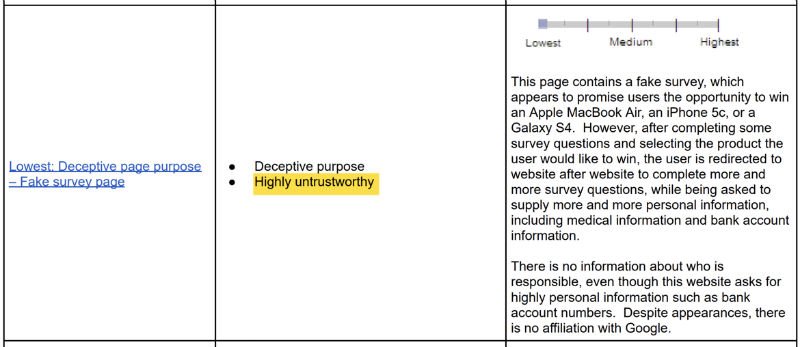

List of potential trust issues
With all of the above in mind, we have looked at winners and losers of the August 1-mid October algorithm changes, combined with things outlined in the QRG and we have put together a big list of issues that we think could be considered a sign of low trust. While we don’t know exactly how Google assesses these algorithmically, we do think that all of these things matter.
A recent interview on CNBC had a very interesting quote from Ben Gomes, VP of Search at Google:

If the QRG tell us what Google wants the algorithm to do, then all of the following should be considered important. We have also included our thoughts on how to remedy each of these situations (if possible).
Negative BBB info
We have discussed this factor earlier in this article, along with examples. If you have a negative rating on the BBB, then this can cause Google to assess your site as lower quality.
How To Fix This
We would recommend taking time to respond to every single complaint, whether it is on BBB or another review site. Respond in a way that shows that you are trying to remedy the situation. Never respond in anger.
And of course, if your BBB rating is low because there truly are some questionable or frustrating business practices, some serious changes may need to be made in how your business runs.
Negative reviews online
The QRG instruct the raters to find review information on Yelp, BBB, Google Shopping and Amazon (if applicable):

They also say that even a mildly negative reputation can be a sign of low quality, especially if you are YMYL (Your Money or Your Life):

How To Fix This
If you have a few negative reviews, I believe that it is unlikely that this is going to cause a problem. But, just as we mentioned with the BBB listing, if your negative reviews truly are a sign of bad business practices, then things to need change in order for the business to rank well. In the past, you could take a bad business and often you could still rank it well with enough links. This is not the case now.
Respond to negative reviews and fix the problems that are causing them.
Lack of expertise
If you are writing on a Your Money or Your Life topic (medical, financial, legal, eCommerce or any other topic that helps people make important decisions), you absolutely must have expertise to write about this. The QRG are full of examples of articles that are considered low quality because of a lack of expertise.
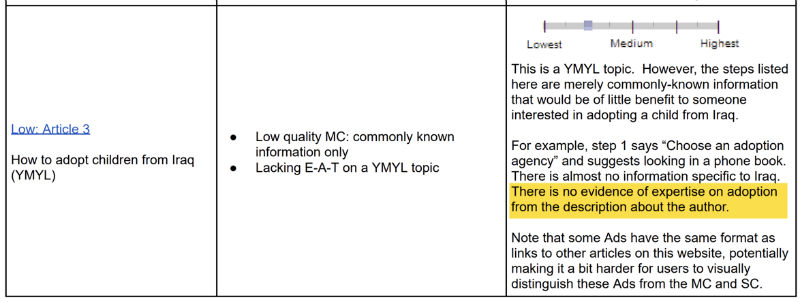


How To Fix This
We have seen great increases in traffic in conjunction with quality updates for some clients of ours that went out and hired physicians to medically fact check their articles. If you have YMYL articles that are not written by people with E-A-T in this area, it is going to be difficult for you to rank well.
It is also important that your authors are recognized online as authorities. If you have been practicing law for twenty years, but there are no external sources online that recognize you as a legal expert, ranking could be difficult. The key to improving in this area is to find ways to get mentions in truly authoritative places. It’s not easy to do… unless you actually are an authority!
I asked Gary about E-A-T. He said it's largely based on links and mentions on authoritative sites. i.e. if the Washington post mentions you, that's good.
He recommended reading the sections in the QRG on E-A-T as it outlines things well.@methode #Pubcon
— Marie Haynes (@Marie_Haynes) February 21, 2018
Lack of online authority
If you are writing on YMYL topics, you need to be recognized online as an authority.


You can have the best information in the world, but if no one recognizes you as an authority on your subjects, it’s likely going to be difficult to rank well.
How To Fix This
You will need to get mentions for your business or your authors on authoritative sites. Gary Illyes from Google has said in the past that Google knows which parts of the web to trust. They know that a mention in the contributor’s section of Forbes is very possibly paid, and as such, they ignore those.
To get truly authoritative mentions, you need to be generating buzz about your business or producing content that truly gets people talking about you. Traditional PR can help here. Producing and promoting truly great content can help as well.
Be careful not to fall into old link building tactics here though. If a link is easy to get or self made, there is a good chance that it will not help.
YMYL info not kept up to date or properly referenced
If you are a medical site it is imperative that every claim you make is backed up by science. We recommend doing at least a quarterly review of each of your important posts to see if new research has been published that is relevant and helpful.

![]()
How To Fix This
Do a regular review of posts to see what needs to be updated. If appropriate, keep Google alerts set for scholar.google.com to see if new research comes out that is applicable to add to your articles.
Make sure that wherever possible, medical claims are backed up with links to scientific research articles.
Contradicting science
This is a big one! If your subject area is one that is controversial and not backed up by scientific research, it may be difficult to rank well.
![]()
Quite a few of the sites that came to us for site reviews after seeing a big drop August 1 likely dropped because of this issue. We had several sites that were natural remedy sites or essential oil sites.
Take a look at Doterra.com. Now, this is not a knock on this company. I just know (from my Facebook news feed) that they are well known as providers of essential oils. Essential oils may be helpful and there is some science to support some of their benefits. But a lot of essential oil claims are likely ones that are not backed up by science.
Doterra saw a big drop on August 1:
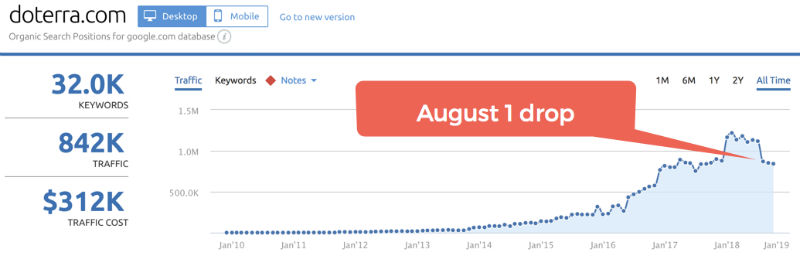
Most of their top keywords now are for people doing branded searches:
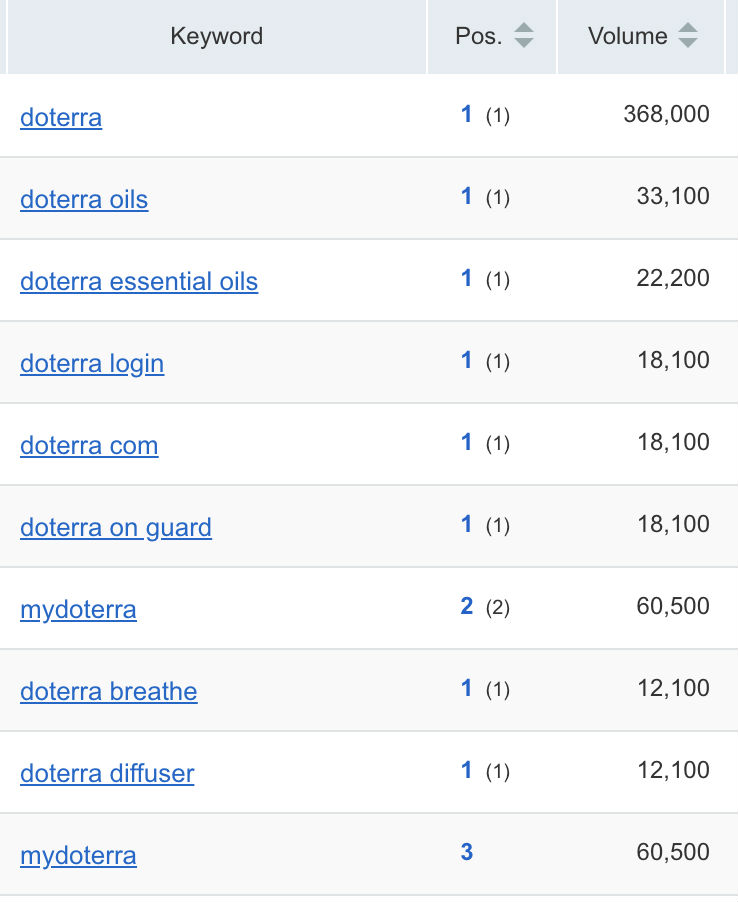
Prior to the August 1 update, this site ranked between #2 and #4 for “essential oils”. They are now at #21.
I have heard similar stories from other companies selling natural products. One of these companies shared with me that their legal team will not allow them to reference scientific articles. Unfortunately, if you are writing about health topics and you are not backing up your claims with science, it is likely that Google treats you as not completely trustworthy.
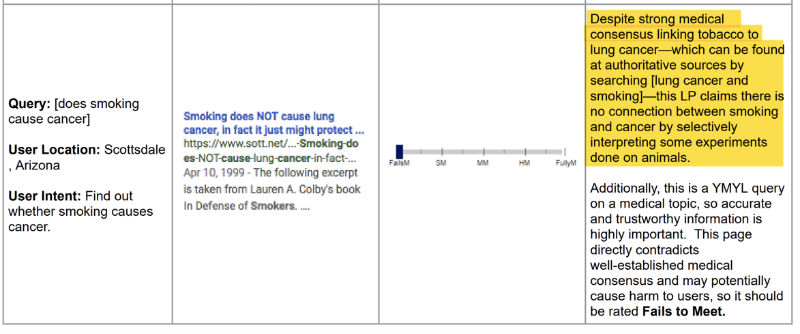
How To Fix This
Wherever possible, link to scientific references. This could be from within the article, or as footnotes. It’s hard to say whether you need to link with followed links. I think either is probably fine, but just to be sure, I would actually recommend following these links. I want to do everything I can to make sure that Google sees these references.
If you have a lot of content on your site that contradicts science, I do think that it may help to put a disclaimer on the post. We don’t know whether Google can algorithmically see this, but it is likely something that would help users to trust the site.
Lack of info on who is responsible for the site / lack of contact info
The QRG are clear in telling us that it is important to know who is responsible for a site’s content.


If you have a website that is providing YMYL info in an anonymous way, you are likely not going to rank well.
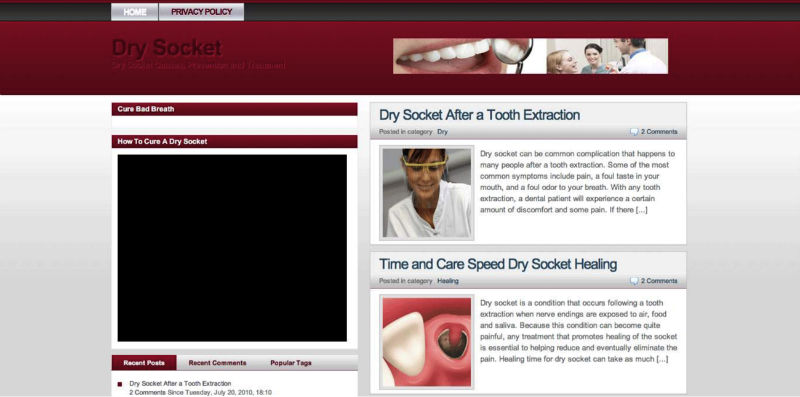

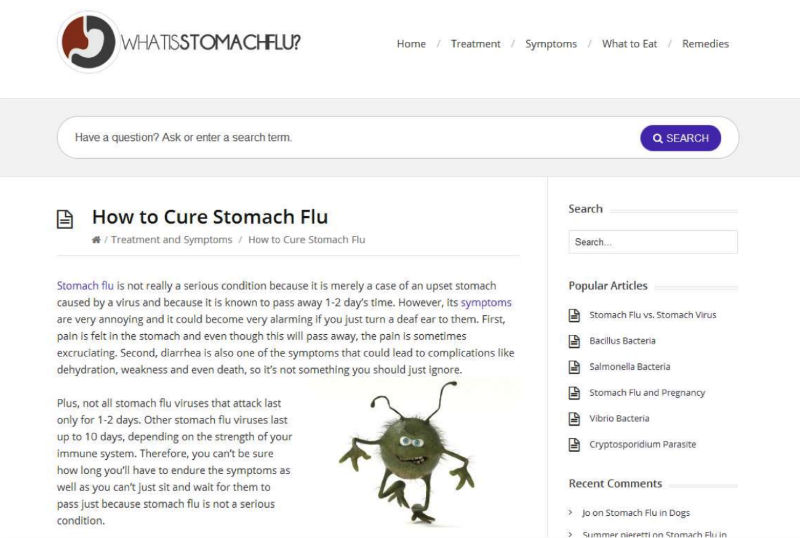

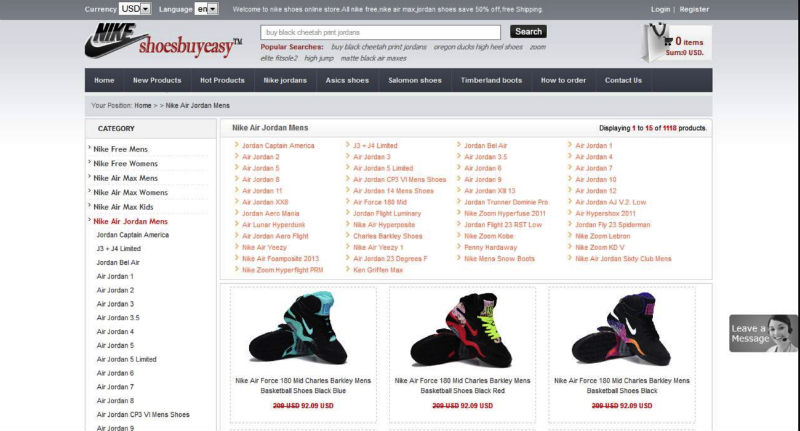
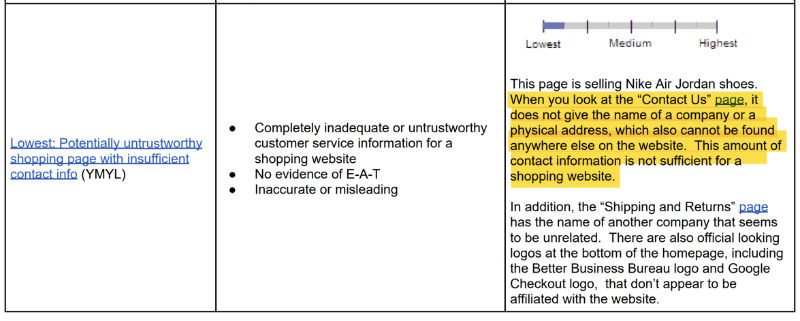
It is also important to make sure that customers can easily contact you.

How To Fix This
Have an easy to find About page. Make it clear on that page who is responsible for the content of the site. Unless there is a really good reason for anonymity, mention the names of the people who run the site and contribute to it.
On your contact page, make sure that it is easy for customers to contact you.
Terms and conditions info, and refund info, is not easy to find
I believe that this is a very important factor!

If your sell products or take transactions, it must be easy for people to find refund information. (Note: This is a classic case of the cobbler’s kids having no shoes, as my own website doesn’t currently have any information on refunds or returns. We’re working on it!)
How To Fix This
Make sure that your Terms and Conditions page is easy to find. A followed link in the footer is likely sufficient. While I can’t prove this, I also think it is important to have this page indexed. If a searcher is looking for “your brand + refund” they need to easily be able to find this information.
I also think it is important to have a friendly refund policy. If you saw drops with these algorithm updates and you have a lot of complaints that people are not able to exchange items, this could possibly affect Google’s assessment of quality for your site.
Selling products on a non-https site
Wait? Am I saying that https is a bigger ranking factor now? Take a look at this line in the QRG in regards to low quality characteristics:
![]()
If you are taking transactions, I believe you must be https in order for Google to trust you.
Unmoderated user generated content
If you’ve got places on your site that allow people to create their own content such as comments, forum discussions, etc. this needs to be closely moderated.

If you can’t moderate the content and remove spam, then it may make sense to not allow UGC at all.
Don’t be too quick to get rid of UGC though. Google has confirmed that they really like high quality UGC.
Breaking news time: high quality UGC is GREAT for your site. Crack down on lowq UGC instead of getting rid of it altogether #defcon1
— Gary 鯨理/경리 Illyes (so official, trust me) (@methode) October 6, 2015
Grammar and spelling errors
This likely isn’t a huge issue for most sites. If you have the odd error in grammar or spelling, I do not think that Google will see you as untrustworthy. But, if your site has a large number of them, it likely makes people distrust you.


Deceiving users
This is a big one. Hopefully this doesn’t apply to your site!
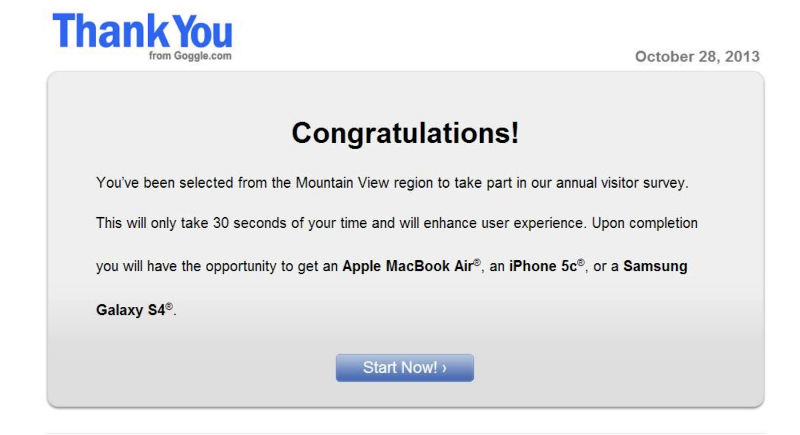
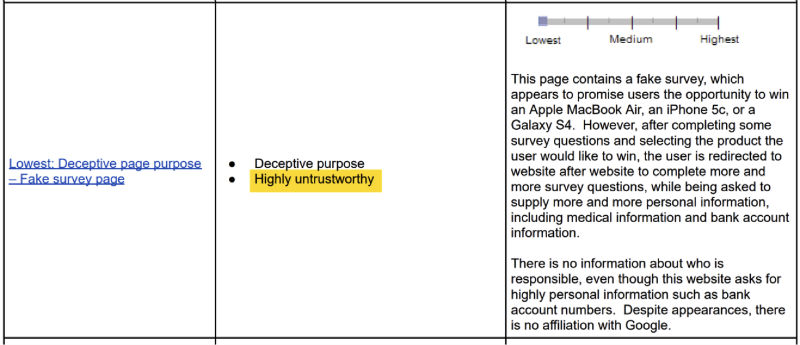
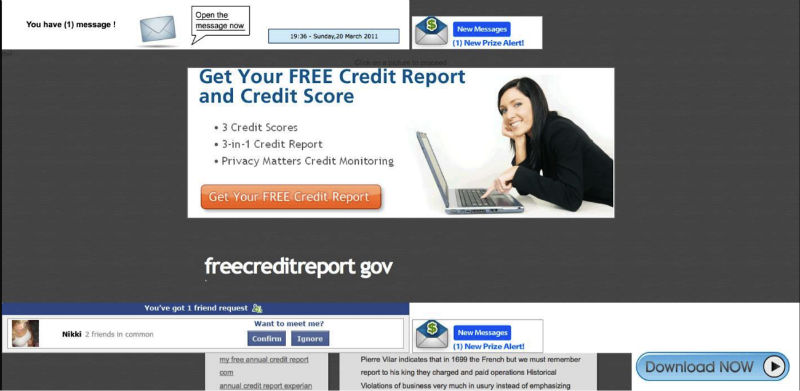

Distracting Ads
If you have ads that are deceptive or annoying to users, this can impact Google’s assessment of quality for your site.


How To Fix This
This can be a hard thing to assess on your own site. I would encourage you to have someone who is not connected to your business navigate your site while you watch. Are they accidentally clicking on ads? Are they getting annoyed? If so, things should change.
The purpose of the site is completely for sales
This is a tough issue to explain, but I do think it is important. We saw a lot of drops in sites that used to rank for informational queries, but worked really hard to funnel people into sales. Imagine you were doing a search on how to use a glucometer. In the past, a site that sells glucometers could rank really well. Now what we are seeing is that sites that are more informational heavy rather than transactionally heavy are ranking well. Now, what we are seeing is that the sites that are ranking well are ones that do a really good job at primarily providing information. Sales are secondary to the purpose of the page.
This example is a little extreme, but is in the QRG.
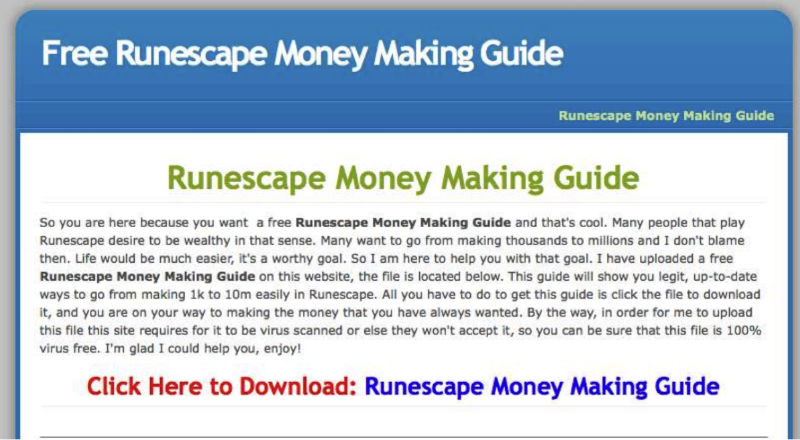

While this example is of a site that was very obviously trying to deceive people, we do believe that a lot of sites that saw drops starting August 1 were ones for which the main purpose of the page was to sell, and that providing information was a secondary purpose.
If you saw drops, I would recommend that you look at how pushy you are in your attempts to sell. It’s not wrong to sell things, but if you lost rankings for informational queries, it is possible that Google thinks your main purpose is sales. As such, they may not to rank you for people who don’t intend to buy.
The QRG instruct the Quality Raters to determine the purpose of every page that they visit.

We believe that if Google determines that the main purpose of a page is to sell something, then they won’t send people to that page if it is clear that their intent is to get information (as opposed to buying a product or service.)
I have heard anecdotally of several sites that saw massive traffic drops but no drop in conversions. This makes sense to me as I feel that Google is getting better at figuring out a searcher’s intent. For those who really do want to buy, Google is probably ok with ranking transactional sites.
One example of a site that saw drops was a site that used to rank #1 for the “keto diet”. This was their above the fold content:

This site saw massive drops on August 1.
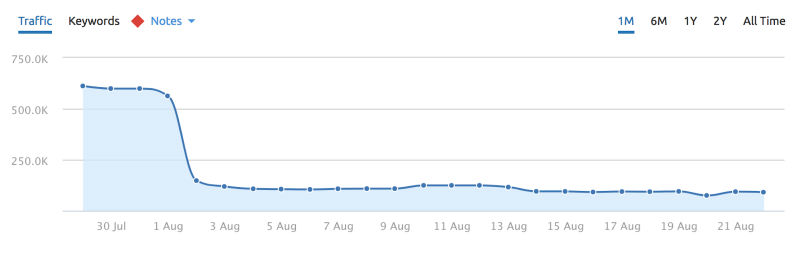
I believe that there were several issues with this site, but one of the important ones is how heavily they pushed people to buy. People can see through the tactic of saying “Ah! Our product used to be $147 and now just for you it’s $47!” Also, most people who Google “keto diet” are looking for information to describe the diet rather than to purchase a program.
How To Fix This
This is a tough one. If you saw drops with these algorithm updates and none of the previously mentioned trust issues are resonating with you, you may want to attempt to tone down the sales tone of your site. Make the information the primary purpose of the page, and sales secondary.
The purpose of the site is misleading
This is not something that I have quotes for from the QRG, but I still think it is important. We saw some drops in sites that we believe are due to users being mislead in terms of the site’s purpose. For example, one site was a lead generating site. They have medical advice and their main source of monetization is to send leads to a particular type of medical doctor.
When you go to the site, it looks like the purpose is simply to give information. This site lists on their “About us” page that they are a consumer advocacy group and that they exist to help provide people with information.
This site saw big gains on August 1 and had them all clawed back on September 27. We believe that what happened here is that the site saw a boost because they were doing almost everything correctly in terms of trust. They have medical doctors as authors (or in some cases as fact checkers, listed as co-authors). They reference scientific articles. They keep articles up to date. They provide good, factual information and do it in a way that is better than almost all of their competitors.
After the August 1 boost, their site appeared highly for many medical queries, which meant that many of the Google Quality Raters’ would now be assessing the site. We think it’s possible that Google asked the Quality Raters to determine what the purpose of a page was an whether it was meeting that purpose. In this case, while it appeared that the purpose of their articles was to provide information. Everyone knows though, that there are very few sites that exist online without some sort of monetization purpose. With a little digging in this site, it becomes obvious to see that the purpose is actually to connect people with doctors (and subsequently make money from selling the leads.)
We can’t prove this, but we feel that this could be seen as a deceptive practice as it is not well disclosed.
How To Fix This
We are encouraging this business to be much more straightforward in telling people what the purpose of the site is. While they do provide information, they should disclose how they make money.
If you saw drops in connection to one of these algorithmic updates and you are being a little bit sneaky in hiding your monetization methods, then you may find that you can regain trust by being more clear about what you are doing.
This also applies to affiliate sites. If you make money from affiliate sales, disclose it. We have seen drops in sites that use cloaked affiliate links. These are links that kind of trick a user into thinking that they are staying on your site. For example, I might think I’m clicking on a link with more information about how to choose a new pair of shoes. But, I may be taken directly to Amazon without knowing it. Sites using a cloaking WordPress plugin that creates /go/ links (to make it look to the user like they are staying on site if clicking) may possibly be seen as lower quality in my opinion.
If you need to trick people, or hide some monetization information in order to convince them to convert, this is likely going to cause trust issues with searchers and also with Google.
Real life examples
This week my team and I spent quite a few hours analyzing sites that saw gains and drops to see if we could figure out why. Now, keep in mind that our full site quality reviews take us up to two weeks to complete as we have an extremely thorough look at a huge number of issues. But, our goal here was to take the list of losers from Sistrix’s post and see if we can make a case for any of the above trust issues contributing to the drop.
These are not our clients and we have not done a thorough review. But, here are our cursory thoughts. For each of these you’ll see the SEMRush estimate of traffic followed by things we think Google could be considering untrustworthy.
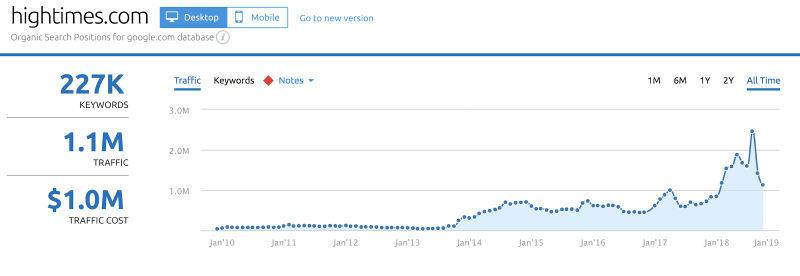
- This site is super ad heavy. The above the fold content is almost completely taken up with ads or images and very little text.
- Medical content written by people with no medical E-A-T.
- There is no information on the site telling us who is responsible for the site.

- This site initially saw gains Aug 1 and then lost them starting September 27.
- We found several posts that are on medical topics, but written by authors with no obvious medical E-A-T.
- There are quite a few negative reviews online:

- Another thing we would likely check if we were reviewing this site is whether the site promotes products that perhaps are not backed up by science.


- There is no information in articles to tell us who wrote the article and whether they have medical E-A-T.
- There is no information on the site to tell us who is responsible for the content on the site.
- In the posts we checked, we could not find references to scientific studies. There also was no indication that posts with medical information were being kept updated.

- This site saw gains Aug 1 and then big losses.
- This is not https://news.ycombinator.com/ which is known as “Hacker News”. We have another client in a similar situation. They call themselves “The council for _____” and yet, there is an official group with that name that is much more widely recognized as the authority. It may be that Google is getting better at figuring out which sites truly are the authority.
- The About page doesn’t tell us who is responsible for the site.
- There are quite a few negative reviews. Some point out some “markety” business practices that we mentioned earlier in this article.

- They sell products on their site, but we could not find information on refunds. They do have a terms and conditions page, but it’s hard to find as it exists on a subdomain.
This last example is a client of ours. It is a really interesting case. They came to us for help after a traffic drop. We felt that all signs pointed to E-A-T issues, but couldn’t figure out why as the main author of the site really appeared to be known as an authoritative expert.
After a bit of digging, we found out that this author actually had a bit of a secret with some issues with the law years ago. I can’t go into details, but these issues made this person significantly untrustworthy.
We advised the site to cut ties with this person and get other authors who have good E-A-T. Our thought was that Google no longer trusted the site. We advised that there was a good chance that with a future update they would start to see improvements. It took a long time, but it looks like this is finally happening!

There are many more examples, but this article is already long enough, so we won’t add more!
Conclusions
I really do believe that the changes that Google is making these days are significant. I believe that Google is doing everything they can to only rank sites that are trustworthy. If you have seen drops on any of the following dates, you need to pay close attention to possible trust issues:
- August 1, 2018
- September 24, 2018
- September 27, 2018
- October 1-9, 2018
There are also some other dates on which there were smaller updates likely related to site quality. You can find these on my Google algorithm update list. Also, if you want to stay updated whenever Google does a significant algorithm change, you can sign up for my newsletter here:
tl;dr
This was a long article! To summarize, my theory is that this latest wave of algorithm updates is primarily due to trust. Any of the following could potentially cause Google’s algorithms to distrust your site:
- Authors who are lacking E-A-T.
- Reputation issues, especially with the BBB.
- A YMYL (Your Money or Your Life) site that has very little external reputation information. (i.e. if no one is talking about your business, then Google may not want to rank it.)
- Lack of scientific references (where appropriate).
- Articles that could be kept up to date are not.
- Having information that contradict science.
- Lack of information regarding who is responsible for the site, and also contact information.
- No terms and conditions page. No information on how to get a refund (if applicable).
- Unmoderated user generated content.
- Distracting or deceptive ads.
- No obvious purpose for the site. (This is a big one! I feel that some sites saw drops because they have not made it clear how they monetize. If your site exists to sell leads to people, or make affiliate sales, you should make this clear.)
- Other deceptive or fraudulent issues that would make people not trust the site.
I do also think that link quality can be a component of trust. We noticed that most of the sites that saw changes in October of 2018 had link issues. Some had disavowed and some had not. I do think that Google has algorithms outside of Penguin that determine how much trust they can put in your link profile.
Given that we have seen some good improvements in some (not all though) sites that we have filed a disavow for, it may make sense to do a link audit and disavow if you know you have a history of links made for SEO purposes.
Do you agree with my theory? Do you think that Google can algorithmically determine trust?
I would love to hear your thoughts in the comments below.


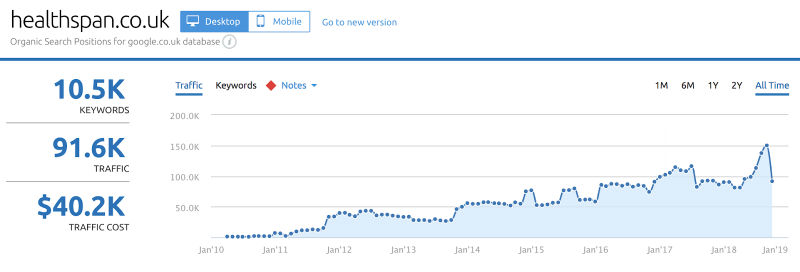



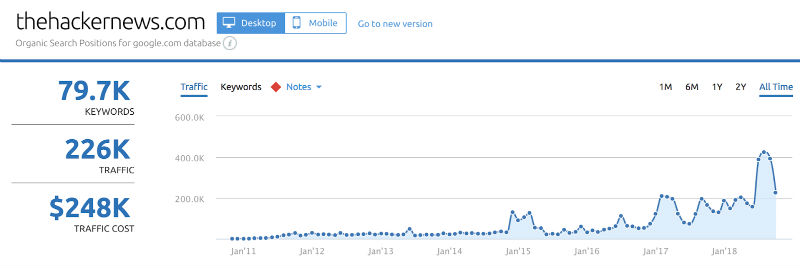
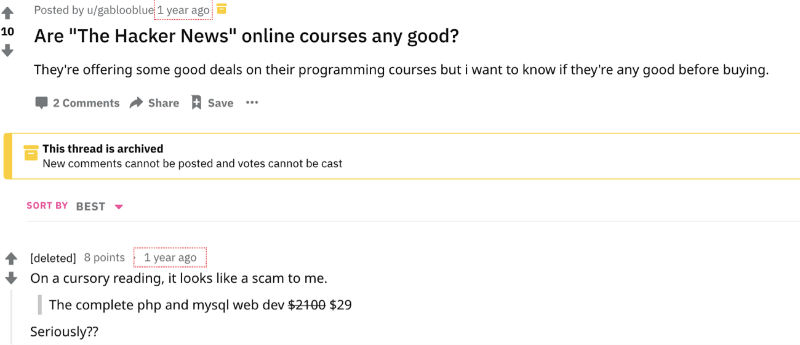

Comments
THIS is the sort of information we’ve been craving! Only read up to the Dr. Axe part but already extremely encouraged that we have something actionable to work on. Thank you, Marie!
I think I agree with your theory, after reading every word of this. Backing out a bit and thinking about how conversational AI is likely going to be ubiquitous quite soon, EAT and especially Trust (as you focused on here) is likely going to be critical for that “one right answer” (since a voice result now, and probably in the future as well, are not choices, but one single answer). As that AI-driven-future fast approaches it seems logical that trust would be critical; and for Google, mandatory to ramp up on how to evaluate trust algorithmically. Like, right now.
Hi Marie,
As usual, a great content as you always find the right way to simplify such a huge-complex topic. I’d like to focus on 2 parts:
(1) – I believe it was John Mueller the one who recommends not to focus on changes because there’s not a particular mistake, therefore there’s nothig to fix. What he DOES recommend is to keep focusing on UX. Why do I mention this? Because of the part where you recommend to disavow links (if applies that you have a history of strong linkbuilding). IMO I would not touch anything related to links, not until this storm has fully passed.
(2) – “I could be wrong on this, but I believe that link quality is now a component of trust.” When you say ‘link quality’, do you mean it as a ratio overall? (9 of 10 links are low quality links = bad quality ratio = bad link profile) or the lack of strong links means it is not a good link profile (independently of the whole amount of links)?
I hope I was able to made myself clear, especially in the (2) part. I would truly like to receive an answer on this, I also think this is strongly (can’t confirm if exclusively) related to EAT.
Thanks,
José Luis
Great points José.
Regarding links, I think the algorithm is really complicated. I think that early Penguin was pretty black and white in how it assessed a link. Either a link was good, or it was bad. But now, I think that the algorithm is super smart in determining which links to count.
There are likely link algorithms outside of Penguin that look at a site’s link profile and say, “Hmmmm…a lot of the links to this site are untrustworthy, so we’ll put less trust in the entire link profile.” I also think it’s possible that links are connected to E-A-T. At Pubcon Vegas next week I’ll be presenting a theory of mine in which Google only wants to count links from sites with decent E-A-T.
What I’m trying to say is that Google is getting better at determining which links are there because someone truly wants to recognize your content or your business. I think that with this update, if you didn’t have many links like that, then you may have seen declines.
“I think that early Penguin was pretty black and white.” That’s really funny! 😀
Seriously though, this is the best article on (E-A-)T I’ve read so far. I hope I’ll be able to convinve my boss(es) to let your team do a site quality assessment. We could really use your expertise!
Ha! I don’t even think I realized I was using a pun there. 🙂
I had another strange change after September 27th. My rankings and click-through-rate remained the same, but the number of impressions, and thus the number of visits has gone down 30 to 40%. No difference here per page, keyword, country or device, all the same pattern.
I have quite some backlinks to my site, from around 600 domains, with good domain ratings but generally secondary pages, so low page URL ratings, 95% url rating 1-10, but I don’t know whether that’s abnormal.
I would be happy to share more data with you.
Hey Marie love this. I went to BBB and saw Dr. Axe is currently revamping his account there. Guess he saw your post, lol I am an American who lives overseas and of course I do not have a BBB rating. I checked to make sure nothing derogatory. Would this hurt me as I got bombed big time on Aug 1 algo?
Hi Sam,
If we’re doing a site review for a client and they don’t have a BBB listing, what we’ll do is check and see if their competitors (or the top ranking sites for their main keywords) do. If they don’t have a BBB listing, then you’re probably ok. What we also look at is where competitors have profiles. For example, in the UK, many businesses will have a trustpilot listing.
We don’t know how Google looks at this algorithmically. Our goal though is to be able to show them that you have more people talking about you, and more people saying great things about you as compared to everyone else.
It looks like Dr. Axe is in the midst of an absolute customer service crisis. Check out this synopsis. https://urbol.com/dr-axe-reviews/ I think Marie called this one correctly because everything else in ahrefs is impeccable for the domain. Their E-A-T is obviously being drastically impacted by customer reviews and it’s interesting that the algorithm can “see” this.
Thank you so much for taking me here, now I got to know what is E-A-T and above ideas definitely helps me in recovering my client site from Google Birthday Update.
Thank you so much for this amazing article, Marie! I’ve been watching these algo updates in real time from inside your newsletter, and I knew they’d probably effect a client of mine, but wasn’t sure how to advise her. This is so helpful!
You use a lot of medical examples, and it makes sense to make sure content is at least co-authored by a doctor with good BBB ratings.
But what about financial-related sites? For example, if someone was writing about finance and *used* to be a Certified Financial Planner, but no longer works as one and so doesn’t have any directory listings as one, how would you suggest attacking EAT issues? Many of their backlinks come from content they’ve written on other sites, so I’m not sure if that will continue to count in the new Google or if that may be contributing to the dip we saw throughout September. I’d super appreciate your feedback on this, but regardless, this post has been super helpful 🙂
E-A-T is primarily earned based on links and mentions on authoritative sites. While I do think *some* guest posting can help, what Google is likely looking for is true mentions of the individual because people want to recognize their expertise. The key is to find ways to produce content that the authoritative places would want to quote. I’m a fan of HARO for authoritative mentions as well.
Hi, thanks for sharing those insights and thesis. One of my client site was impacted last week, just like most competitors in the segment.
I will try to implement some of the changes, lets see if whether it will improve the situation
A great read !
I have a question and would appreciate your guidance to create some E-A-T.
You also talked about backlinks from relevant niche is important. How if there is a mix of guest posting on:
a) Relevant niche
b) Online publishing sites with different categories including relevant niche
c) A small portion of unrelated websites
Does that still sound spammy?
My personal belief is that Google ignores most guest posting links. If it is a link that is made because of an exchange of content for a link, then this is not really an authoritative mention. The types of links that Google wants to count are ones where someone mentioned you because they truly wanted to recommend you, your content or your business. This type of link is really hard to get unless you actually are known as an authority.
Thanks for this detailed info, now I know how I can start working on my new startup blog, instead of churning out contents I will work hard to build good rating across my niche from top authorities
Excellent info Marie! I’ve been following your posts closely since the Medic update as two of my clients’ websites got hit.
One is a global ecommerce store for Ayurvedic medicines, other is a resume writing service (strange that it got hit!)
Your example for Doterra states that their ranking dropped for the word “essential oil”, and maybe for “essential oil for glowing skin”, “buy essential oils” etc or some other queries like these.
My question is, what if the users actually intend to buy essential oils or learn about them? Shouldn’t Doterra’s results be shown in the results on top?
If Doterra’s rankings decreased, same would have happened to its competitors as they are also in the same space. So if we see in perspective, it should again be ranking at almost the same positions as before (unless it did some really shady stuff).
Point is, can Google decided whether or not people ‘should’ search for only science-backed stuff? What if people are explicitly searching for something they believe in, but not fully supported by science.
What should a business like Doterra, or Ayurvedaforall (my client) do in this case where the market itself is not favored by Google?
Thanks,
Piyush
Good points Piyush. I should point out that usually for us to determine why a site dropped, it will take a good week of investigation and we have not done that for Doterra.
One thing I did note though is that webmd is currently ranking #1 for “essential oils”. This reflects the idea that most people are looking for information when they search for this term.
Very practical advice Marie – thanks for sharing 🙂
Hi Mary,
Thanks for a very comprehensive post.
A few questions though: what have you seen in the last couple of months in non-healthcare sites in terms of fluctuations? Are you able to shed some light on specific patterns and your theory on likely causes for those?
We have seen some seemingly inexplicable fluctuations on some B2B sites (media properties) that are reputed in their industries with content contributed by senior professionals/experts.
Look forward to your thoughts.
Thanks,
Manoj
While medical sites have been hit the hardest, sites across many industries that are not medical were affected as well. One pattern we saw is that many very large sites with loads of thin content have been hit. But really, any business that requires people to trust them could have been affected by these updates.
I have no idea how I read such a huge article.E-A-T seems to be important from user point of view.I am glad YmYL is being reviewed carefully.Too much misinformation everywhere.Thanks for this.Just pinned this to revise later.
In many ways this update is insane:
1 – It is visible in the medical field that large sites with diverse content have taken up better positions than small sites in niche areas, even though the niche site has more relevant and elaborate content on the topic.
2 – Great sites with articles without authorship get a better ranking for the key term than the niche site.
3 – Sites with content embedded in a single page, get better positioning for a term than websites that try to create various topics or facilitate mobile browsing for users, since it is known that users tend not to scroll. “Congratulations google for another idea of shit”
4 – It becomes virtually impossible for someone to start a legitimate business activity on the internet since starting from scratch will not have the EAT premises.
5 – Create a monopoly where the small trader now has to offer their products or services … in AMAZON, FACEBOOK or another giant! Congratulations on the most absurd ever seen in two decades of web development.
Hey Marie
Super useful. Easily the best breakdown of this I have seen to date.
In the era that we live in, fact checking is super important – and the preeminent search engine has a responsibility to ensure that the pages they return are as factual and reliable as possible.
To me this feels just like a natural extension of many things we have seen before. And a drive towards more factually relevant and authoritative, credible sources being preferred.
Great read
Marcus
Hi Marie,
One thing about Dr. Axe is that he didn’t write all the articles on site. After August he added authors to the articles and many are not written by him.
Personally – I’ll be surprised if he wrote any article but the same thing applies to any large sites.
Even if you look at the biggest winner – healthline. It is easy to see that all their nutrition articles are looking exactly the same which is impossible to do if you have so many authors. I suspect that the author is the reviewer.
Also – from my experience lots of medical people are useless in writing articles to the general public.
It will be interesting to look at the BBB review of sites that gained traffic.
I’ll be surprised if Dr Axe. lost 80% of the traffic just because of the bad BBB reviews because lots of other sites without bad reviews lost traffic as well.
There are more thoughts on the connection to BBB rankings and Google’s rankings here: https://www.mariehaynes.com/does-google-use-bbb-ratings-as-a-ranking-factor/
Google update is very influential on my blog, the decline was very drastic and until now it gets worse. what can I do?
Hey Marie,
A quick comment about dottera – in terms of content they shouldn’t be shown for informational searches. Their articles are extremely short and don’t provide much value. So the fact that they lost their spot(s) for informational searches makes a lot of sense. This is just an eCommerce website.
In that respect it’s interesting to point that the verywell websites (for example verywell health) are doing very well. Despite the fact that their articles are extremely short and hardly based on any evidence. From what I’ve seen they usually don’t link back to the studies and they just have their title. For example see their article about “The Benefits of Cedar Essential Oil” – short article with 2 references at the end without any links to these studies. I would call it low quality article that lacks E.A.T
Essentially all these verywell sites are rebranded about.com broken to different sub niches.
This could indicate that Google changed something to do with links as their content (usually) lacks E.A.T
Happy to get your comments.
Thank you very much for this article ..it has helped me learn things about the algo update that has hurt our business for a month and has created me more sleepless nights of fixing it ….
Hey Marie
this is an e-book 🙂
Great post
Federico
Google just confirmed that BBB rating (or any third part rating) doesn’t count in the assesment of the quality of a web site.
Now we are a bit more clueless.
ref. https://www.seroundtable.com/google-bbb-algorithm-ranking-26673.html
I’m not convinced that was Google confirming anything…John’s language was vague. Here is more info https://www.mariehaynes.com/does-google-use-bbb-ratings-as-a-ranking-factor/
A client of mine saw a huge drop in organic visits on October 1st, 2018. This is a dentist with great UX and trust. Nothing fishy was done. Link profile is OK. Other dental sites that I built did not share the problem. I am mystified.
I find it absurd, do not discuss something fundamental. The search engine evaluate EAT factors to do ranking should be formally prohibited by the government.
There are several sectors where such characteristics do not apply or where the EAT is constituted locally through government regulations.
What we are seeing is google playing the role of government agencies, which is insane!
I see several sectors aimed at selling medical equipment, which has its regionally established customer base, which are authorized by government agencies, but which google in their disinformation regards as unreliable!!?!
We are at a more abstract level talking about censorship and I am not surprised that Europe is gradually mobilizing against this, see the recent example of Article 13 or the billion dollar fine applied google’s dishonest practices. Where is google’s EAT in this case?
Google may be genuinely trying to establish what or who is trustworthy but I would argue that trying to do that at scale via algorithms is, at best, misleading and at worst becomes a barrier to entry for small and local business.
We run a niche regional vacation rental site in Australia and have been doing so since 2005. Our business has been severely impacted by the major listing sites (AirBnB, Homeaway, Booking etc) who have scale but no local knowledge. None of those sites have first hand knowledge of any of their listed properties. As a local listing site we have visited and photographed every one of our listings and we know the owners personally.
The giant sites rely on their onsite review systems where reviews are far from nuanced and boil down to how many stars are given. The average across the several million listings that AirBnB has is 4.5 stars out of 5 according to a 2015 study by Boston University and reported in a vrmintel post recently. How useful is that?
Yet these sites with massive scale are deemed more trustworthy than smaller regional sites. It should not be forgotten that these travel websites provide the great bulk of Google’s advertising revenue. Are the “seed” sites such as newspapers really more trustworthy? They also rely on advertising for their revenue. So much news today is more often than not opinion and the emphasis is often on creating fear or controversy because it attracts eyeballs.
The truly scary thing about E.A.T. is that it is biased toward scale and has become a barrier to entry. In essence it becomes more about “Who you know rather than what you know”.
I hear what you are saying. I think the problem here is that Google is wanting to show users the results that they are most likely to want to see. So, for the average user who perhaps has never heard of your company, in order to outrank Air BNB and the big players, you have to be able to provide significantly better information so that a user would by far prefer your site over the big players. And that is hard!
You and I likely know that you have more knowledge on the listings that are local to you. But, in order to rank well you need to convince Google that you are an authority in this space. I’d definitely be spending time on traditional PR. The more you can get mentioned in authoritative places the better.
Great point and great reply.
Hi Marie,
Great article. I understand why Google is showing sites for EAT. However, this feeds into the mouths of big business. SMBs make up the majority of businesses in the US and yet we have to compete against big business in every aspect. This has let SMBs to grow their brand by being a self promoter and advocate. You cannot rely on Google sending your free business as a SMB. One of my sites as built EAT and has a decent DA of 44. However, it is competing against websites with DAs of 60+ which get the benefit of mostly page 1 results. This will not keep the doors open. Networking and relationships will.
Thank you for the in-depth overview, Marie. My Canadian company was hit VERY hard on Sept 27th, largely due to a negative SEO campaign that I was much too late in discovering. Still haven’t recovered. But what I don’t understand is why Google doesn’t weight the business reviews from its very own platform more heavily as a Trust signal? Third party providers like BBB and Trustpilot are all “for-profit” review services which can be more easily manipulated and managed than the authenticated Google-user-generated reviews. These third-party sites will all remove bad reviews if you are a paid user and give them a good enough reason. Google Reviews now seem to be more authentic, and less anonymous than most. Also, regarding Author Trust, it is very difficult to establish authoritative mentions for certain industries (like mine, vaping) where you are forbidden by Health Canada to make any health claims. How does one become an authority on a “quasi-health” subject like quitting cigarettes with vaporizers or nicotine addiction when you are essentially gagged by the government?
Great questions.
First, we don’t know whether or not Google uses the reviews from GMB. On one hand, they have access to them. On the other, they’re not generally indexed in organic search, so perhaps this is a factor.
The main point that we’re making for reviews is not to say that Google will rank you more highly the more reviews you have, but rather, your review profiles online paint a picture as to whether people are legitimately talking about your business in a positive light.
Your point about not being able to make health claims is a really tough one. We’ve seen a couple of sites drop where we felt the issue was lack of scientific references, and yet their legal teams will not allow them to add these references.
I think at this point, if you can’t change the rules on this, then the answer is to not post articles that really should be scientifically referenced. For example, an article on how to clean your vape doesn’t need medical E-A-T, but an article on why vaping is good for your health (or better than smoking) is one that you should avoid writing. In the same vein, if you have medical articles that are competing against the likes of webmd, healthline, etc. you may want to consider noindexing these unless they are performing well.
Hey Marie,
If Dr Axe rebranded his website by doing a 301 redirect to a new domain. Do you think this could recover his rankings?
(Obviously the new brand would need to improve their business skills to avoid receiving a bad reputation in the future).
It will be interesting to watch! I think that if the business practices that caused the bad reputation can be fixed, then Google’s algorithms can pick up on this. However, it’s likely going to take a lot of work.
I have a new client that is in the photography space. They do photography all over the world and have more than 10,000 photo shoots a year.
The company has a great product and service (although there are some obvious improvements necessary around page speed which are abysmal – like 20+ sec range).
That being said the company was on a steady growth path upward until around middle Oct 2018.
The company is not accredited by BBB, but does have an A+ rating. They also don’t have a GMB account.
The reviews online from other sources are extremely positive and in decent quantity….and they are 100% real.
Link generation is solid and 100% natural as well. Their PR is mostly along traditional lines – mostly announcements around partnerships that are focused on extending their brand and services with partners plus the occasional notice for being a female run start up in newspapers and such. The ratio of backlinks to linked domains is a bit higher than I’d like – but it looks like this is driven more by them using the same PR partners over a few years. None of their links are spammy. They’ve basically gone from 0 to 1200 linked domains in a very straight even line over 5 years. The content they create is all around story telling in of their clients and building the business/product/service so pretty legit.
And yet since Oct 2018, there has been a decline in organic. First with a pretty significant decline that lasted from mid October to late November and then a slower decline since then. Some of this might be due to some pretty basic issues around how they are managing their internal linking, 301s, etc. coupled with page speed issues, but it does appear the decline is more algorithmic than internally generated. Thoughts?
Sounds like a tough situation Marston.
I do feel that in October of 2018 there were a number of link related updates. I’d take a thorough look to see if perhaps there is a history of unnatural link building in the past.
If the drop seems to have started on or around September 27, then I’d look for the trust related issues outlined in this article. It can take us a few days to uncover those for a client, so it’s hard to comment without a deep investigation unfortunately.
Hi Marie,
Thank you for sharing such a nice article about google algorithms. I found it really helpful to me. but I like the September 27 update. I hope you will post this type of content in the future.
This is one of the best posts in the history of algorithm change …
Updated and very interested.
I await update.
thanks and good job!
Great man!!!
Hello Marie, thank you for this great article. We were drastically hit on November 8th by some algorithm update and so I was looking at the BBB information to gain trust. However, we are based in Guatemala and BBB seems to only operate in the US and Canada.
How can we, in Latin America, gain trust?
Hi Sven. If you were hit on November 8, I’d highly recommend reading this article we wrote:
https://www.mariehaynes.com/november-8-2019-google-update/
Most of the sites that we have seen that were hit by this update had issues with links that could be seen as unnatural by Google.
Regarding BBB, if it is not used in your area, then it’s not likely something Google is looking at. The goal is to figure out where your successful competitors are getting legitimate reviews and mentions online and then try and do the same. Otherwise, the info in this article you’ve commented on contains a lot of thoughts on how to improve trust on the site.
Thank you for sharing such an important and useful information regarding the Google algorithms and updates. Such an amazing content. This is very useful information regarding the website SEO for SERP. EAT updates are important for the website content to rank on google. Thanks for sharing. Looking forward for such amazing articles.
This is one of the best posts in the history of algorithm change. Updated and very interested.Thank you for sharing such an important and useful information regarding the Google algorithms and updates. Such an amazing content.